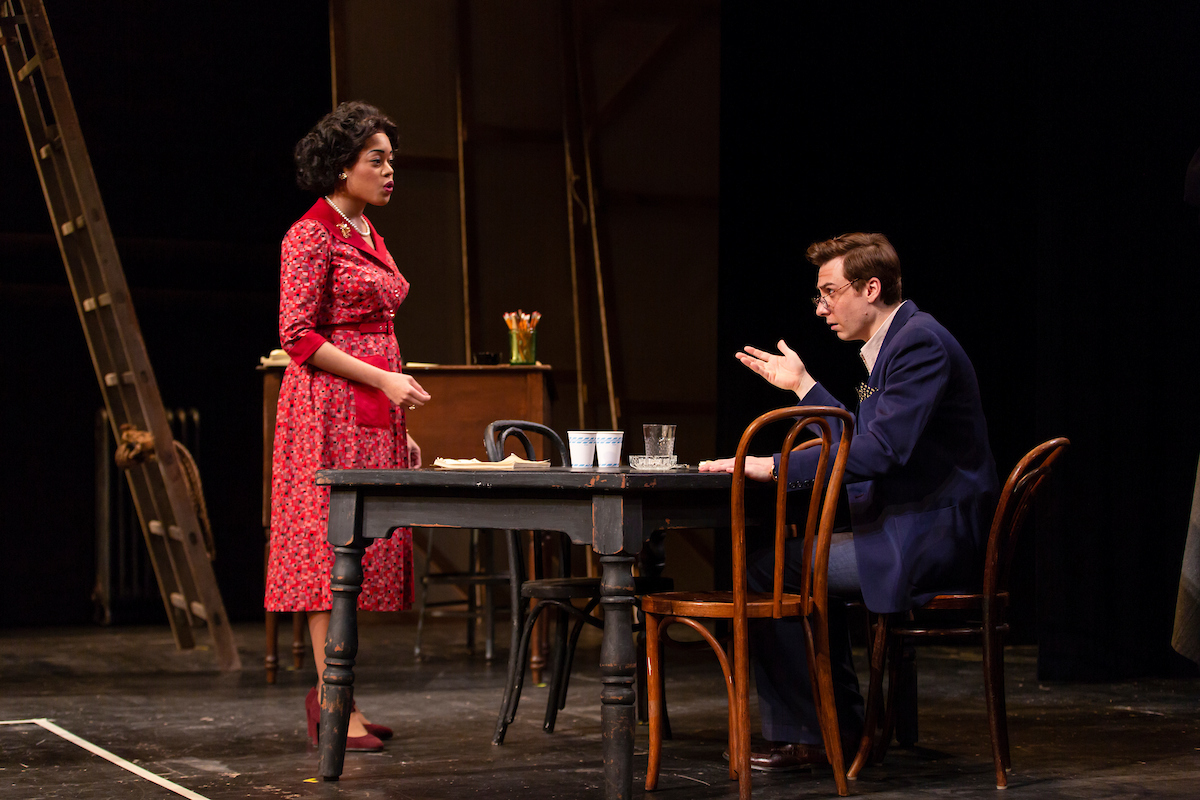Review of Novios: part one, Yale Cabaret
Arturo Luis Soria III, a third-year actor at the Yale School of Drama, steps up fully as a playwright with part one of his two part play, Novios (“boyfriends”), playing for two more shows tonight at 8 p.m. and 11 p.m., directed by third-year actors Sohina Sidhu and Amandla Jahava. Soria, besides being a graceful presence in the Yale Repertory Theatre’s production of El Huracan at the start of this season, played a theatricalized version of his mother last season at the Cabaret in his original play Ni Mi Madre. There, he mostly stuck to English; with Novios, he lets many of his characters speak in their native Spanish, with subtitles on screens in the corners. The effect can be a little awkward, since these characters speak very rapidly, often in four-way conversations, and yet even those whose Spanish is almost nonexistent (like me) shouldn’t have any trouble following the dialogue.
And the dialogue gains greatly by being heard in its native tongue. Four members of the kitchen staff at a Manhattan restaurant, though of different national origins, speak Spanish as a lingua franca closer to home than English—Gallo (Nefesh Cordero Pino), Dominicano (Raul Díaz), Micki (Christopher Gabriel Nuñez), and Luis (Jecamiah M. Ybañez). Then there’s a Russian, Vlad (Devin White), a white Chef (John Evans Reese), and the newcomer, Antoine (Gregory Saint Georges), a Haitian hired as dishwasher. The use of Spanish establishes a core bond among the four, even as they often argue and deal in putdowns and points of honor. In one scene, Gallo goes off into a fantasy addressed to an absent love, and her words are pure poetry. Cordero Pino also plays L’Azteka, a fierce spirit in a striking gown decorated with Aztec motifs. L’Azteka seems to exist primarily in the dream mind of Luis, who emerges as the main figure here.
The play’s plot develops with a sense of inevitability, but, all the while, the liveliness of the characters, of their full engagement with the worlds they’ve left and the places their trying to get to, keeps us fully in the action, and keeps subplots percolating. There are impromptu dance routines to music the workers bicker over, there are shared blunts with smoke blown (for real) out the window, there is male coupling on top of a kitchen cart (to the cheers of the audience), and there’s Chef being condescending to his sous-chef Gallo, and short-tempered on the phone to his partner. And there’s Vlad, a character who plays as a bit of a loose cannon and who gets in a nice diatribe against “the home of the free” rhetoric that keeps bringing naïve immigrants to America.
The characters’ status in the country where they are making a home for themselves vary and that fact contributes to their general demeanor. Dominicano and Antoine seem the most easygoing; Micki has a short temper; Vlad is slightly sinister; Luis, put upon because he’s so often late (he may not have an actual home-base), is the one with attitude about why he deserves better than a job as kitchen help; Gallo at times plays at den mother to the boys, but clearly has a backstory of her own. Part 1’s main focus is showing a relationship develop between conflicted Luis (in a very affecting performance by Ybañez, a third-year director at YSD) and Gregory Saint Georges’ confident and likeable Antoine. The other characters, we sense, will move forward too, as the play moves into Part 2, and we’re left looking forward to when we’ll have the opportunity to watch the entire play.
Gerardo Díaz Sánchez’s set, a central kitchen space, is very effective, and Nic Vincent’s Lighting Design makes for a visually interesting show. The movement of so many bodies—dancing, cooking, pounding meat, and even creating an insistent percussion routine—is greatly facilitated by Jake Ryan Lozano’s choreography, including passionate physical outbursts and sexual expression.
While still a work in progress, Novios has passion aplenty, a strong sense of the people it represents, and the kind of mystery and poetry that makes for exciting and involved theater. Don’t miss a chance to see its first half early on, brought to life by the actorly empathy and instincts of directors Jahava and Sidhu in the Cab’s intimate and efficient space.
Novios: part one
By Arturo Luis Soria III
Directed by Amandla Jahava & Sohina Sidhu
Producer: Estefani Castro; Choreographer & Intimacy Coach: Jake Ryan Lozano; Dramaturg: Nahuel Telleria; Scenic Designer: Gerardo Díaz Sánchez; Costume Designer: Matthew Malone: Lighting Designer: Nic Vincent: Projection Designer: Sean Preston; Sound Designer: Andrew Rovner: Technical Director: Martin Montaner V.; Stage Manager: Fabiola Feliciano-Batista
Cast: Nefesh Cordero Pino, Raul Díaz, Christopher Gabriel Nuñez, John Evans Reese, Gregory Saint Georges, Devin White, Jecamiah M. Ybañez
Yale Cabaret
February 21-23, 2019



